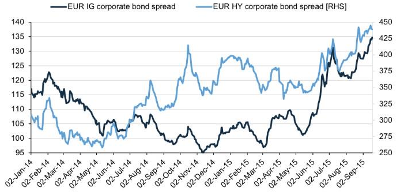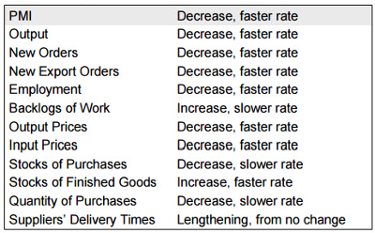If you thought October was a scary month to own stocks, just wait for December…
Last week was unbelievable. Not only did many new problems arrive that worried the financial markets, but previous concerns grew significantly larger. Let’s make a short list:
- Volkswagen (XETRA:VOWG) is Germany’s largest employer. Its stock fell 40% in one week as the company was found to use software to hide its actual diesel emission outputs.
- A pharma company raised the price of a drug 5000% which caused the The New York Times to write a story leading to a platform brick for Hillary Clinton which caused a 20% hit to Biotech stocks and a 10% correction in Healthcare stocks.
- Rep. Boehner resigned from Congress, worrying investors about increased dysfunction in Washington and the potential for a miss on a transportation legislation, and the debt ceiling hike which could lead to a year-end government shutdown.
- Talk of Michael Bloomberg entering the Presidential race as an Independent which could add uncertainty to the Democratic voter base.
- This week is the end of Q3, so we will begin reading through earnings reports in two weeks. The S&P 500 is looking to post ‘down’ numbers due to the Energy space and Multinationals fighting the strong dollar. But what will their guidance be looking towards in a more difficult global environment in the Q4?
- Since next month is October, do not forget about year-end tax selling by mutual funds which will peak during the month. There is no way that a portfolio manager will want to give taxable cap gains to any fund holder if they have negative YTD returns. So expect the worst performers to be tax-loss harvested out of the portfolio.
Meanwhile, the Fed Chair and other members are still talking about a 2015 rate hike lift-off… Could someone send them a chart of High Yield or even Investment Grade corporate bonds? How do they expect to pull off a rate hike in the thinly-traded month of December when Congress is a question mark and the global growth picture is not any more clear? If the Fed does hike, I am putting my money on Jack to snatch Santa and do away with Christmas this time.
So in looking at global equities from a U.S. investor perspective, there is little to be positive about given the lower-low and the ACWI Index trading below its major moving averages…
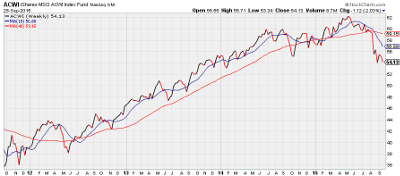
Looking more specifically at the local markets will show larger markets are now entering Bear market territory with the majority now in Correction mode…
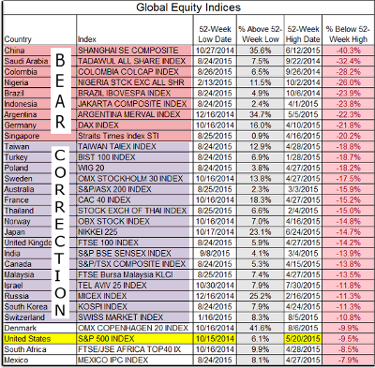
(@MktOutperform)
So what is causing global equities to continue to be bulldozed? Look no further than Caterpillar’s news release last week. Global mining equipment sales continue to be dragged lower by global growth and falling commodity prices. Tough times for Peoria as 10,000 jobs will be let go…
Caterpillar Inc (NYSE:CAT). said it would slash thousands of jobs and cut manufacturing space by 10%, as it expects weakening demand from resource and construction companies will continue to drive down sales of its heavy equipment through at least next year. The company said the job cuts could exceed 10,000 people through 2018, including 4,000 to 5,000 salaried and management positions to be eliminated by the end of next year. It aims to reduce annual costs by roughly $1.5 billion. Caterpillar said it now expects 2015 revenue to be about $48 billion—$1 billion lower than its previous projection—which would mark a decline of about 27% from a peak of nearly $66 billion in 2012. And it said 2016 revenue likely would fall a further 5% from 2015, which would be the first time in Caterpillar’s 90-year history that sales declined for four consecutive years. ~ (WSJ)
Meanwhile, as Jeff Macke illustrates so well, the Board’s decision to bet on a commodities rebound via stock repurchases has not worked…
@JeffMacke: If $CAT bought an index fund instead of Cat shares they’d have saved $4b. A breakdown…
Like Caterpillar, Glencore (LONDON:GLEN) is a global commodities company that is also under distress from the weakness in commodity prices…
But as the chart below shows, Glencore’s problem is one of debt, not stock repurchases. As commodity and asset prices continue to fall around the world, expect to see many similar charts appear as corporations with debt come under pressure…
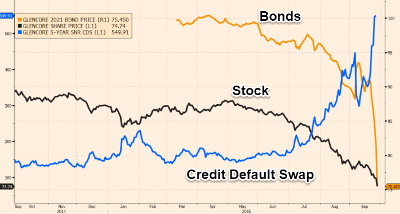
(@FinancialTimes)
The credit pressures are building up leading to notably wider European spreads, not just in High Yield, but also in Investment Grade. This continued breakdown should be a RED FLAG for equity investors…
@Eurofaultlines: Despite ECB QE, 2015 has not been a good year for €IG and €HY
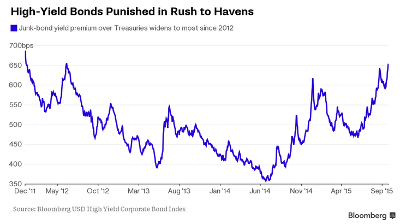
Here is the widening spread for U.S. High Yield credits. Again, another RED FLAG…
We have blamed the wider Junk Bond spreads on Energy issuers, but last week there was a buyer’s strike. If this continues, you can say goodbye to easy financing for M&A which will remove one large pillar of support from stock prices…
Altice (AMS:ATCA) on Friday sold $4.8 billion of junk bonds to fund its $10 billion purchase of Cablevision Systems Corp (NYSE:CVC)., according to S&P Capital IQ LCD. When the deal was shopped earlier this month, Altice expected to sell $6.3 billion of debt, investors said. A 10-year bond was priced to yield 10.875%, compared with yields as low as 9.75% that were suggested by bankers initially, according to S&P Capital IQ. Olin (NYSE:OLN) on Friday sold $1.2 billion of bonds to pay for its pending acquisition of Dow Chemical Company's (NYSE:DOW) chlorine-products unit. Earlier in the month, Olin was expected to sell $1.5 billion of bonds, fund managers and analysts said. The annual interest rate on Olin’s 10-year bonds sold Friday was 10%, up from 7% expected earlier in the month, according to S&P Capital IQ…
Companies have announced $3.2 trillion of M&A this year, according to Dealogic, emboldened to merge by cheap debt and the long stock rally that began after the financial crisis. That puts 2015 on pace to rival 2007 as the biggest year ever for takeovers. Issuance of junk bonds backing M&A deals hit a year-to-date record of $77 billion through Friday, according to data from Dealogic. A souring of investors on junk bonds could limit the availability of financing for deals that require a lot of borrowing. Banks have been under pressure from federal regulators to reduce their loans to such companies, and a pinch in the bond market could leave those deals struggling for financing. ~ (WSJ)
Meanwhile, non-bank lenders are also staying out of the water: “When there is a shark attack, there’s no prize for being the first one back in the water”…
When banks began to scale back financing for energy companies earlier this year amid the slump in oil prices, some of Wall Street’s savviest asset managers sought to capitalize by lending at high rates. That didn’t work out so well, as crude continued to plunge and lenders were stuck with losing positions. Now, banks are again contemplating credit cuts. But this time hedge funds and private-equity firms are showing more reluctance to step in…
This wariness threatens to create a liquidity crunch for oil-and-gas drillers that have relied on relatively cheap funding for their operations. After investors snapped up more than $37.5 billion of bonds issued by junk-rated energy companies in the first six months of 2015, just $5.9 billion has been raised since then, according to data compiled by Bloomberg. ~
(Bloomberg)
China released some key manufacturing data last week. Nothing positive to see here…
Key Points:
- Flash China General Manufacturing PMI™ at 47.0 in September (47.3 in August). 78-month low.
- Flash China General Manufacturing Output Index at 45.7 in September (46.4 in August). 78-month low.
And then there is Brazil. While Volkswagen crushes the German DAX, leave it to Petroleo Brasileiro Petrobras SA (NYSE:PBR) to send the Brazil BOVESPA to new lows…
@latampm: #BRAZIL $PBR PETROBRAS 5-year CDS crosses over 900 bps, more than double the widest spread from 2008.
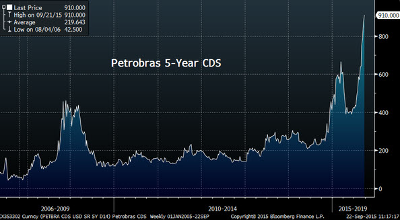
As investors lose total confidence in the Brazilian Government and its credit and equity markets, capital is fleeing the country leading to an ever cheaper Brazilian real. So that Christmas vacation in Rio is now 40% cheaper than last year’s price…
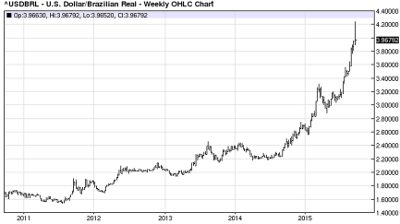
Now it gets serious for the President of Brazil: The Bill and Melinda Gates Foundation Trust joins the lawsuit to sue the heart of corporate Brazil (and main source of Brazilian Government corruption)…
“The depth and breadth of the fraud within Petrobras is astounding. By Petrobras’s own admission, the kickback scheme infected over $80 billion of its contracts, representing approximately one-third of its total assets,” the lawsuit said. “Equally breathtaking is that the fraud went on for years under PwC’s watch, who repeatedly endorsed the integrity of Petrobras’ internal controls and financial reports. This is not a case of rogue actors. This is a case of institutional corruption, criminal conspiracy, and a massive fraud on the investing public.” ~ (WSJ)
Speaking of Emerging Markets, here is your Financial Reporting EM Quote of the Week…
“The Malaysian ringgit is playing the role of stunt-double in a PG-13 film this year, appearing onscreen only to take a beating now and then.” ~ (PatrickMcGee/FinancialTimes)
How falling Energy prices directly impacts the world’s largest asset managers…
Saudi Arabia has withdrawn tens of billions of dollars from global asset managers as the oil-rich kingdom seeks to cut its widening deficit and reduce exposure to volatile equities markets amid the sustained slump in oil prices…. This month, several managers were hit by a new wave of redemptions, which came on top of an initial round of withdrawals this year, people aware of the matter said. “It was our Black Monday,” said one fund manager, referring to the large number of assets withdrawn by Saudi Arabia last week. Institutions benefited from years of rising assets under management from oil-rich Gulf states, but are now feeling the pinch after oil prices collapsed last year. Nigel Sillitoe, chief executive of financial services market intelligence company Insight Discovery, said fund managers estimate that Sama has pulled out $50bn-$70bn over the past six months.
(FinancialTimes)
An epic bull run in Biotech comes to an end… (via iShares Nasdaq Biotechnology (NASDAQ:IBB))
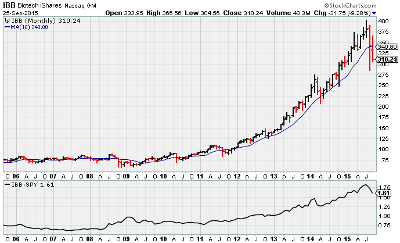
All it took was one Tweet…
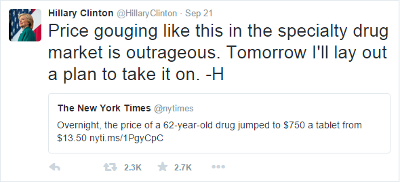
It was probably the most expensive tweet in history. A 21-word missive from Hillary Clinton on Monday wiped more than $40bn off the value of U.S. pharmaceutical and biotech stocks. The Democratic presidential front runner decried as “outrageous” the “price gouging” by some drug makers and promised action to stamp it out. The next day she announced a package of measures designed to rein in pharmaceuticals “profiteering”.
Her intervention coincided with an outcry over a 5,000 per cent price increase levied on an anti-infective drug used by AIDS and cancer patients. The company — Turing Pharmaceuticals — is run by a 32-year-old fast-talking former hedge fund manager, Martin Shkreli, who instantly became the unapologetic face of an industry accused of putting profits over public health. Mr Shkreli responded to the ensuing media storm with a tweet linking to an expletive-filled Eminem song, “The Way I Am”, containing the lyrics: “I’m tired of all you, I don’t mean to be mean. But that’s all I can be is just me.”
This tale of two tweets has thrust drug pricing to the center of the U.S. presidential campaign and sent investors fleeing in fear of a clampdown on one of the world’s biggest and most profitable industries. (FinancialTimes)
Where did all the Buyers of stocks go? The majority of shares traded is occurring on big down days, not big up days. This is another difficult sign for equities…
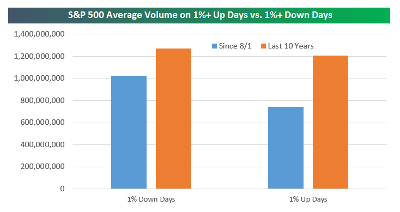
(Bespoke)
“Ninety percent of the game is half mental.” (Yogi Berra)
Why are the dips being sold and not bought? What changed from “a few months ago”? Not fundamentals. Psychology. The positive feedback loop has been broken. This is the thing the fundamentalists miss. You can bury your head in 10q’s and 8k’s and memorize a thousand facts about a company. You can become an expert on a given stock sector and establish relationships with all of the executives who run the show. You can build your own DCF models and outguess the other guessers on earnings estimates and forward guidance. But until you accept that market mood and behavior is as big a factor as the fundamentals, you won’t ever be completely honest with yourself. The E is only half of the PE. No matter how good you are at understanding and predicting the E, you’ve still only got half the story. The P is determined entirely by psychology. (The Reformed Broker)
You have to keep an open ear when the manager has crushed his benchmark for over 15 years…
One of Europe’s most brilliant investment managers is warning of a new global financial crisis on the horizon and has moved a huge chunk of his portfolio into cash. Crispin Odey, who founded London-based Odey Asset Management in 1991, says the turmoil that began last month has only just begun, and that equity markets could fall much further. “Our overriding conviction is that we are nearer the beginning of this process than the end,” the hedge fund manager warns clients in his latest report. Stock market valuations worldwide “are so overextended that they will need to fall 30%-40%” before they offer a compelling bargain, he argues. Astonishingly, Odey now holds 29% of his retail investment fund, Odey Opus, in cash — even though the fund is typically oriented toward growth. The firm manages about $11.7 billion in assets. (MarketWatch)
Also valuable to see what the large University Endowments are up to. Here is the positioning and some interesting notes from Harvard…
We are carefully monitoring market liquidity conditions, given that the risk capacity and shock absorption ability of sell-side market-makers is low, as a result of the new regulatory regime that has shrunk balance sheets and reduced risk appetite. The U.S. Treasury “flash crash” of 15 October 2014, when the U.S. 10 Year Treasury note moved a total of 68 basis points in one day, was a stark manifestation of the evaporation of liquidity that can occur even when no material economic event has occurred. The recent high volatility in the U.S. stock market is another indicator that market liquidity can be prone to rapid evaporation. To give an order of magnitude, from 1 January 2015 to 10 August 2015, the S&P had a trading range of 7%. On 24 August 2015, the Dow Jones Industrial Average fell 6.6%, rallied 6.4% and then fell 4.7% within the trading day. The new regulatory environment for financial institutions is having significant effects on the ability of banks to use balance sheets, warehouse risk, or act as market shock absorbers.
The debate about highly-valued assets continues to get louder: private equity valuations are now, on average, at higher levels than in 2007. There are over eighty “unicorns” (venture-capital portfolio companies with valuations over $1 billion), as many as in the last three years combined. Venture capital continues to receive ample funding, and private company valuations are also bolstered by public mutual funds entering late stage funding rounds in significant size. This environment is likely to result in lower future returns than in the recent past.
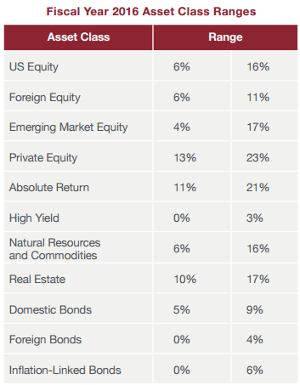
(HarvardEndowmentAnnualReport)
And as expected over at Yale, Mr. Swensen has the Endowment positioned even higher into Alternatives…
Yale University on Thursday said its endowment earned a return of 11.5% in the year ended June 30. The value of the endowment rose 8.4% to $25.6 billion, the Ivy League university said.
The university said its fiscal 2016 asset allocation targets are as follows:
- Absolute return: 21.5%
- Leveraged buyouts: 16%
- Foreign Equity: 14.5%
- Venture Capital: 14%
- Real estate: 13%
- Natural resources: 8.5%
- Bonds and cash: 8.5%
- Domestic equity: 4%
If you are a Mutual Fund, get ready to list your holdings monthly with a 30-day lag…
This week’s SEC Open End Fund Liquidity Risk Management Program asks Fund Companies to file a full portfolio within 30 days of the end of the month. While they do not initially intend to disclose this data publicly, in the report they do address that monthly disclosure of portfolio data would be beneficial to investors. So expect the monthly disclose and report of all positions to make it through to the final draft. (MarketWatch)
Talk about a Crash Test Dummy…
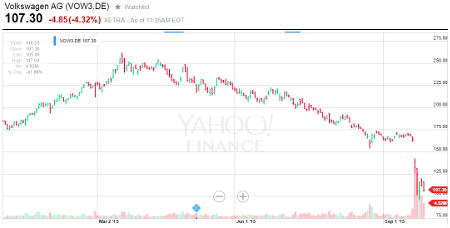
How did this happen?
…what happened at Volkswagen over the last week is actually pretty simple. The company admitted that it had programmed 11 million of its diesel cars—including popular models like the Volkswagen Passat, Jetta, Golf, and Beetle, along with cousin cars like the Audi A3—to cheat on their emissions tests, using something called a “defeat device.” When these cars’ software detected that they were being put through a standard nitrogen oxide emissions test, they switched into a low-emission mode that allowed them to pass the test. Then, once the test was over, the cars reverted to pumping out up to 40-times as many pollutants as the law allowed, while appearing to stay under the legal limit. (Fusion)
Losing the respect of the Regulators, Customers and Employees will cost Volkswagen plenty…
…the fines and lawsuits facing Volkswagen are likely to surpass Enron in both scale and scope. Volkswagen’s potential liability to Environmental Protection Agency fines is $18bn. Add to this fines in most or all of the 50 US states and class action lawsuits by buyers and car dealers who have seen the value of their cars and franchises diminish overnight and you have a massive legal bill. No jury in the U.S. will be lenient with a foreign car company that touted its “clean diesel” technology when the technology on board instead served to hide the fact that particulate emissions were up to 40 times greater. And that is before expert testimony about the effects on children with asthma. Yet crucially, fewer than 5 per cent of the cars in question were sold in the U.S. and regulators in Europe, South Korea and elsewhere have already launched investigations. This is a truly global fraud and global scandal. (Financial Times)
While it feels like the world is crashing, there are still those that will benefit from collapsing commodity prices. For example, check out Nike’s earnings report last week…
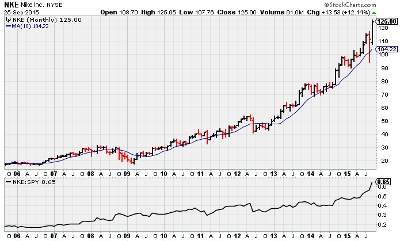
Nike (NYSE:NKE) proved again that a strong dollar can’t keep it down. The U.S. athletic apparel and footwear maker said global future orders excluding currency swings jumped 17 percent in the last quarter.That was comfortably ahead of Wall Street’s expectation of a 10.3 percent gain for the orders, which are an indicator of the U.S. company’s future revenue. Nike shares, which have advanced 19 percent this year, rose 5 percent to $120.68 in after-hours trading. The increases are the fastest future sales growth, on a constant currency basis, since 2012. Nike has managed to weather the impact of the strengthening dollar better than some of America’s largest multinationals. (Financial Times)
…They even crushed it in China!
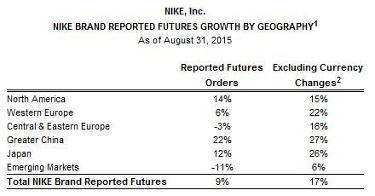
Finally, if you have been to our offices, you know that most of us are using standing desks. We have played with all types of furniture and stacks of paper to support our monitors, keyboards and work surfaces. Here is an affordable, adjustable solution from VariDesk that has recently been moved to the top of our list…
Disclosure: The information presented here is for informational purposes only, and this document is not to be construed as an offer to sell, or the solicitation of an offer to buy, securities. Some investments are not suitable for all investors, and there can be no assurance that any investment strategy will be successful. The hyperlinks included in this message provide direct access to other Internet resources, including Web sites. While we believe this information to be from reliable sources, 361 Capital is not responsible for the accuracy or content of information contained in these sites. Although we make every effort to ensure these links are accurate, up to date and relevant, we cannot take responsibility for pages maintained by external providers. The views expressed by these external providers on their own Web pages or on external sites they link to are not necessarily those of 361 Capital.

